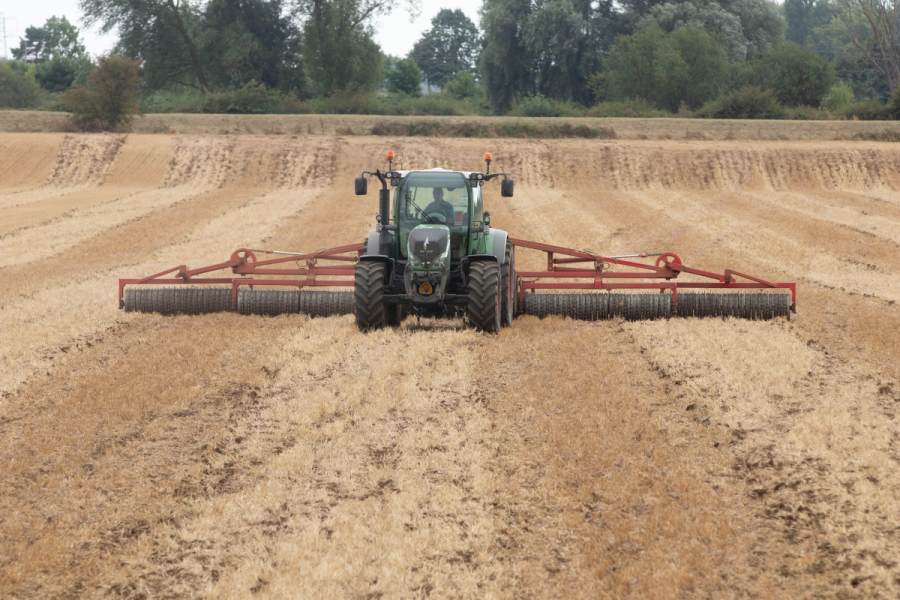By Richard Styles
The harvest for this year in the Côte d’Azur of sunny Suffolk went without a hitch, long summer days, no drying costs, good quality grain and lots of it. Having finished on 6 August, my attention then turned to cultivations. It was far too dry to contemplate anything deep, so we decided to try a range of techniques to improve our soil. In my view, there are five epochs of tillage.
Emotional tillage – this is where the oldest child, having for many a year been told that they weren’t old enough to drive a tractor for some bizarre legal reason, or were in fact unable to reach the pedals, has reached a height and age where they keep pestering you constantly for a tractor driving job. You find an old springtine from the nettles or, even better, an even older set of gang rolls and set them off, with clear instructions on how to put them together. You’ll tell them this job is very important as the straw left behind the combine needs to be flat to stop the flea beetle climbing up into the stalks and hiding. They aren’t actually achieving much except some peace of mind for you and an undisturbed snooze after lunch, but they are as happy as a sandboy*. They will be costing quite a lot of fuel, but you can console yourself that this is still cheaper than a family day out at a ‘fun park’. Always remember to mislay your phone after they have gone. The walk home is good for them.
Recreational tillage – this happens because either your ‘in-law’ has popped over for the day, or that blasted machinery dealer rep keeps hassling you to buy that combine you can’t really justify. Or worse, your partner insists that the washing machine really ought to be plumbed in after four months sitting in the hall. On reflection, Bottom Acres does need that extra pass with a cultivator just to make the perfect seed bed and off you go – forgetting, of course, your phone in the process. You’ll be sure to take food and drink with you to make sure of being undisturbed.
Therapeutic tillage – you’re stuck in the office by enforced deadlines at your busiest time of the year by one of the many government quangos that need to check any or all of the following. The RPA needs your field maps updating as one of them has been lost and is now registered to the local vicar. Your cattle passport has been filled in using the wrong colour ink. One of the pigs has eaten another’s ear tag as it thought it might be lemon flavoured. Your sheep numbers were being monitored by satellite, but the animals went under a tree for some shade and now don’t exist. Your head is full to bursting with all this as you trundle out with a tractor and sense an almost ethereal feeling of well-being as you till the land. On no account take your mobile phone with you.
Competitive tillage – on a warm sunny Sunday, just after an excellent cooked breakfast, you spy your neighbour on his new tractor pulling his, also brand new, Badistan multi-disc/tine/press. You feel compelled to be out in your field as well and show him that not only do have a similar implement, a well-used Bimpo Uptop, which uses less fuel and is wider than his tool. Plus your large tractor is 75hp more than his, so you can show him you can pull your tool faster and deeper as well. What you haven’t considered as you set off, is that his new tractor has a horsepower boost system, making his even more powerful, provided that he travels over 30mph or is pulling a large baler.
No tillage at all – this puts you in something of a quandary as after harvest is completed, you have little or nothing to do until you start sowing wheat in the first week of October. This leaves you with eight weeks of being stuck at home. A straw harrow is bought, 12m wide ought to do it, and your neighbours see you whizzing about at high speed, covering some 100ha a day. Remember, a fully suspended seat is a must. Alternatively, you spend much time and money sowing cover crops, and then destroy them again six weeks later. This gives you a good feeling of achievement and allows you to sleep at night. This feeling of contentment goes some way to mitigating the cost.
Now, I wonder how many of you have actually done any of the above. I have, but I’ll leave you to guess which one.
*Note: Happy as a Sandboy. An old established expression from the days when sandboys (or men) drove their donkeys, mules or horses onto the beach to collect sand and hawk it on the streets to sand the floors of houses, or sold it to builders, or gardeners. They normally finished at the local publicans and took liquid refreshment instead of money, hence the term. Happy as a Sandboy. (Brewers Dictionary)
This article was taken from the latest issue of CPM. For more articles like this, subscribe here.




